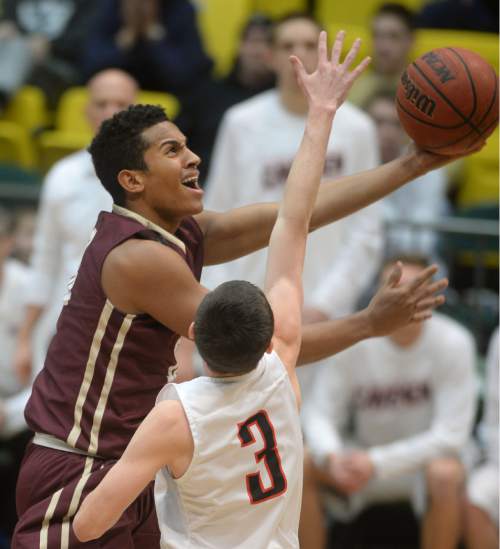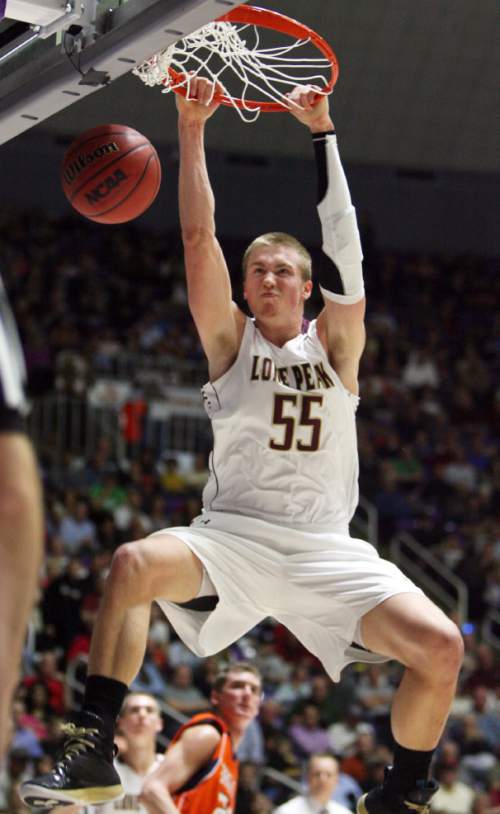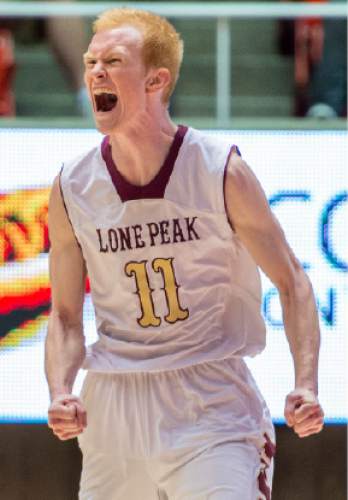This is an archived article that was published on sltrib.com in 2016, and information in the article may be outdated. It is provided only for personal research purposes and may not be reprinted.
BYU basketball is stuck in a kind of no-man's land, in a time loop.
It's living out Groundhog Day, again and again and again, over and over and over, year after year after year. Falling asleep, waking up every day to Sonny and Cher's, "I Got You Babe."
And that's not bad. It's just not great.
It's pretty good, always pretty good. It's the same, always the same.
You could throw a hat over just about all of the Cougar teams since the late 1990s, with the exception of a couple of Jimmer teams. Switch out the names on the back of the uniforms and … well, they're nearly identical — same style, same talent, same emphasis on up-tempo play, same holes in the defense, same success, same limitations, same results.
It's the same team.
Players playing different positions but blending into the same blurred mass: Lee Cummard morphs into Noah Hartsock who morphs into Jackson Emery who morphs into Tyler Haws who morphs into Chase Fischer who morphs into Kyle Collinsworth who morphs into Nick Emery.
As long as Dave Rose is coaching the Cougars, they will be Rose's Cougars.
Which is a good thing. Good, good, good, good, good.
Good is good.
But will BYU ever be something more?
When it was announced a fistful of years ago that the Cougars were headed for the West Coast Conference, on account of football going independent, it was easy to think BYU would have a shot at winning a load of league titles, winning a load of league tournaments. Basketball was officially being downgraded to secondary status to football, but at least dominance would be the compensation, right?
After all, you could darn near load the entire student-bodies of WCC schools combined into the Marriott Center. And schools like Pepperdine, Portland, San Francisco, Loyola Marymount, Santa Clara, Pacific, San Diego, with their quaint little high school gyms and their small crowds and their modest-to-mediocre success, didn't exactly put BYU in a disadvantageous competitive situation.
But maybe it did.
Maybe that setting capped Rose's ability to recruit top athletes, athletes who were beyond the normal draw BYU seemed to get. Or maybe it just stayed the same, same as it ever was, same as when it played in the Mountain West, same nice group of players who would win a decent number of regular-season games, but, in the case of the WCC, not win league titles and league tournaments, and, with any luck, still sneak into the NCAA Tournament with an undistinguished seed that would get the Cougars quickly eliminated.
Again.
It was presumed that Gonzaga and Saint Mary's would present their challenges, and they have.
It's been since Jimmer that BYU was the champion of anything, other than good, and it was just about that same way before Jimmer became Jimmer.
Point is, the question is, will the Cougars ever be something special? While the BYU fan base has been treated to some fine basketball through the years, the thing that really captures the imagination of supporters has been missing — the hope that something huge could happen. Rarely have there been any such dreams in Provo. Over the past 50 years, before Rose, it stirred briefly when Danny Ainge was there. It stirred for a minute in the late '80s, when one of Ladell Andersen's teams edged toward the top spot in the polls after a fantastic start. It stirred with Jimmer.
Other than that … not a lot.
That's what happens when, with a limited recruiting pool, the Cougars don't land top LDS talent. They didn't have much of a shot at Jabari Parker, a Chicago kid who never had designs on playing at BYU. And they couldn't hold onto Frank Jackson, a Utah County Mormon, whose talent blew up right in front of them at Lone Peak High School, so much so that Duke swooped in and took him away.
That's the swirl in which BYU finds itself. Its program is strong, but not strong enough to reel in the kind of talent, even homegrown talent, needed to break out of its mold of sameness. It's good enough to compete in the WCC, but to date not good enough to win even that league.
Next year, the Cougars get an infusion of talent — with more highly regarded players entering the program and returning to it from LDS Church missions, guys such as Eric Mika and TJ Haws and Payton Dastrup.
Perhaps that, at last, will make a difference.
Perhaps those players, with some development, could bust BYU out of its limited weave, out of its normal form, out of its identical groove, out of its worn path, out of its sameness, out of the same story with the same players and the same ending, out of its Groundhog Day.
GORDON MONSON hosts "The Big Show" with Spence Checketts weekdays from 3-7 p.m. on 97.5 FM and 1280 AM The Zone. Twitter: @GordonMonson.







